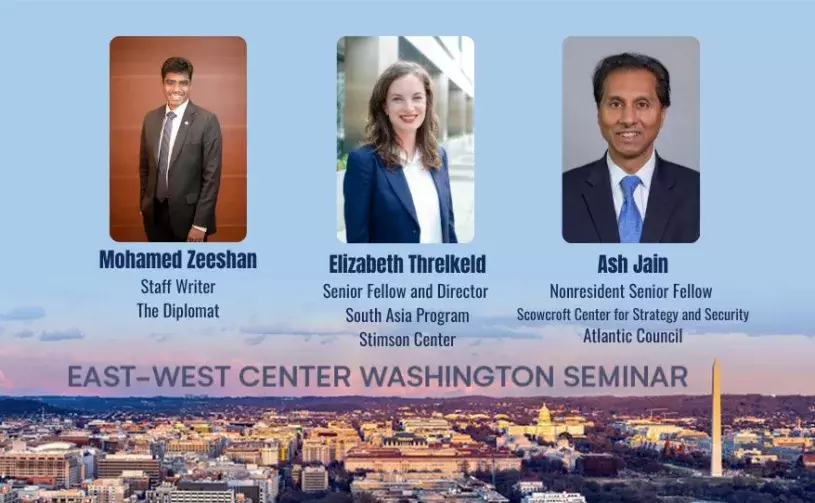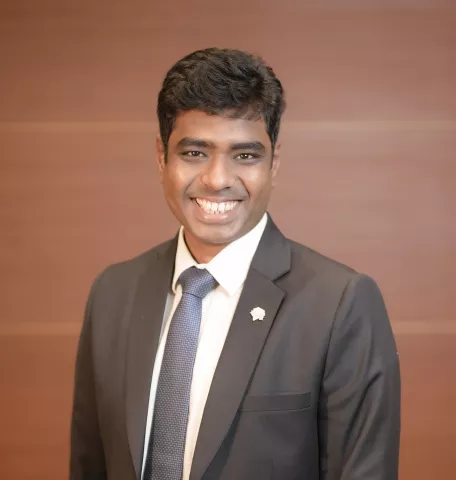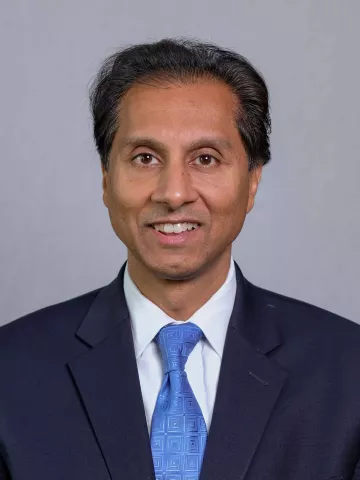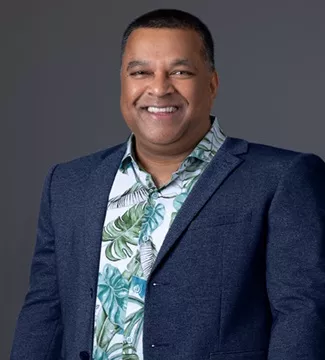Error message

OFFICE/DEPARTMENT
The East-West Center in Washington invites you to an
Indo-Pacific Foreign Policy and Defense Series Seminar:
India's Quest for Global Leadership
A Conversation With:
Mohamed Zeeshan
Staff Writer
The Diplomat
Elizabeth Threlkeld
Senior Fellow and Director, South Asia Program
Stimson Center
Ash Jain
Nonresident Senior Fellow
Scowcroft Center for Strategy and Security
Atlantic Council
Dr. Satu P. Limaye (Moderator)
Vice President, East-West Center &
Director, Research Program and East-West Center in Washington
With rising tensions between China and the US, India has become an increasingly vital player in US foreign policy, particularly in Asia. This year, India hosts a number of high-profile multilateral summits, including the G-20 and the Shanghai Cooperation Organisation. The US also counts India as a crucial partner as part of the Quad, alongside Australia and Japan, touting India as a democratic counterweight to China. Yet, in a broader context, India does not align with the US on various issues, including Russia, Ukraine, Taiwan, Xinjiang and many others. More recently, various political leaders and activists in the US have also highlighted a deterioration in democratic values in India under Prime Minister Narendra Modi, who has a strong enough mandate to shape India's foreign policy in unprecedented ways. In this seminar, Mohamed Zeeshan and discussants will share their perspectives on what India stands for as an emerging power and what its shifting internal dynamics could mean for US interests in Asia.

Mohamed Zeeshan is a foreign affairs researcher, columnist, and the author of “Flying Blind: India's Quest for Global Leadership” (Penguin 2021). He has previously served as a consultant to governments in the Middle East and worked with the Indian delegation to the United Nations. He has written about global geopolitics for the Washington Post, the Straits Times, the South China Morning Post, the Telegraph and other leading publications around the world.

Elizabeth Threlkeld is a Senior Fellow and Director of the South Asia Program at the Stimson Center. Before joining Stimson, she served as a Foreign Service Officer with the U.S. Department of State in Islamabad and Peshawar, Pakistan, and Monterrey, Mexico. Threlkeld previously worked in the Kurdish region of northern Iraq, where she managed development interventions on gender-based violence and ethno-sectarian reconciliation. She has additional work and educational experience in China, Taiwan, and Turkey, and began her career with the Asia-Pacific Security Program at the Center for a New American Security.
Her research interests include South Asian geopolitics, ethno-nationalist conflict, and territorial disputes. She is the recipient of a Department of State Superior Honor Award, several Meritorious Honor Awards, and the Matilda W. Sinclaire Language Award. She speaks Pashto, Mandarin, and Spanish.

Ash Jain is a nonresident senior fellow with the Atlantic Council’s Scowcroft Strategy Initiative in the Scowcroft Center for Strategy and Security and former director for democratic order, where he oversaw the Atlantic Council’s Democratic Order Initiative and D-10 Strategy Forum. His work focuses on strengthening cooperation among democracies and advancing a rules-based, democratic order. He previously served as a member of the secretary of state’s policy planning staff, focusing on US alliances and partnerships, international norms, and challenges to the democratic order — including those posed by Russia, China, Iran, and North Korea.
Jain was a Bosch public policy fellow with the German Marshall Fund Transatlantic Academy and executive director for the Project for a United and Strong America, where he coordinated a bipartisan foreign policy task force to produce a blueprint for a values-based national security strategy. He also served as an adviser for the White House Office of Global Communications and with the Senate Committee on Homeland Security and Governmental Affairs.

Dr. Satu P. Limaye is Vice President of the East-West Center and Director of Research, East-West Center in Washington, and interim director of the Professional Development Program. He created and directs the Asia Matters for America initiative and is the founding editor of the Asia Pacific Bulletin. He is also a Senior Advisor at CNA Corp (Center for Naval Analyses). He is a graduate of Georgetown University and received his doctorate from Oxford University (Magdalen College) where he was a George C. Marshall Scholar.
He publishes and speaks on Indo-Pacific regional issues and supports various US government, foundation, fellowship, and professional organizations. He recently served on the Center for New American Security (CNAS) Task Force on the US-Philippines Alliance, United States Institute of Peace (USIP) Senior Study Group on the North Pacific, Project 2049 Study Group on the US-Australia Alliance, and Global Taiwan Institute-Taiwan Asia Exchange Foundation project on Taiwan’s New Southbound Policy. He serves on the Korea Economic Institute (KEI) Advisory Council and editorial board of East Asian Policy and regional editor of Global Asia.
The East-West Center in Washington invites you to an
Indo-Pacific Foreign Policy and Defense Series Seminar:
India's Quest for Global Leadership
A Conversation With:
Mohamed Zeeshan
Staff Writer
The Diplomat
Elizabeth Threlkeld
Senior Fellow and Director, South Asia Program
Stimson Center
Ash Jain
Nonresident Senior Fellow
Scowcroft Center for Strategy and Security
Atlantic Council
Dr. Satu P. Limaye (Moderator)
Vice President, East-West Center &
Director, Research Program and East-West Center in Washington
With rising tensions between China and the US, India has become an increasingly vital player in US foreign policy, particularly in Asia. This year, India hosts a number of high-profile multilateral summits, including the G-20 and the Shanghai Cooperation Organisation. The US also counts India as a crucial partner as part of the Quad, alongside Australia and Japan, touting India as a democratic counterweight to China. Yet, in a broader context, India does not align with the US on various issues, including Russia, Ukraine, Taiwan, Xinjiang and many others. More recently, various political leaders and activists in the US have also highlighted a deterioration in democratic values in India under Prime Minister Narendra Modi, who has a strong enough mandate to shape India's foreign policy in unprecedented ways. In this seminar, Mohamed Zeeshan and discussants will share their perspectives on what India stands for as an emerging power and what its shifting internal dynamics could mean for US interests in Asia.

Mohamed Zeeshan is a foreign affairs researcher, columnist, and the author of “Flying Blind: India's Quest for Global Leadership” (Penguin 2021). He has previously served as a consultant to governments in the Middle East and worked with the Indian delegation to the United Nations. He has written about global geopolitics for the Washington Post, the Straits Times, the South China Morning Post, the Telegraph and other leading publications around the world.

Elizabeth Threlkeld is a Senior Fellow and Director of the South Asia Program at the Stimson Center. Before joining Stimson, she served as a Foreign Service Officer with the U.S. Department of State in Islamabad and Peshawar, Pakistan, and Monterrey, Mexico. Threlkeld previously worked in the Kurdish region of northern Iraq, where she managed development interventions on gender-based violence and ethno-sectarian reconciliation. She has additional work and educational experience in China, Taiwan, and Turkey, and began her career with the Asia-Pacific Security Program at the Center for a New American Security.
Her research interests include South Asian geopolitics, ethno-nationalist conflict, and territorial disputes. She is the recipient of a Department of State Superior Honor Award, several Meritorious Honor Awards, and the Matilda W. Sinclaire Language Award. She speaks Pashto, Mandarin, and Spanish.

Ash Jain is a nonresident senior fellow with the Atlantic Council’s Scowcroft Strategy Initiative in the Scowcroft Center for Strategy and Security and former director for democratic order, where he oversaw the Atlantic Council’s Democratic Order Initiative and D-10 Strategy Forum. His work focuses on strengthening cooperation among democracies and advancing a rules-based, democratic order. He previously served as a member of the secretary of state’s policy planning staff, focusing on US alliances and partnerships, international norms, and challenges to the democratic order — including those posed by Russia, China, Iran, and North Korea.
Jain was a Bosch public policy fellow with the German Marshall Fund Transatlantic Academy and executive director for the Project for a United and Strong America, where he coordinated a bipartisan foreign policy task force to produce a blueprint for a values-based national security strategy. He also served as an adviser for the White House Office of Global Communications and with the Senate Committee on Homeland Security and Governmental Affairs.

Dr. Satu P. Limaye is Vice President of the East-West Center and Director of Research, East-West Center in Washington, and interim director of the Professional Development Program. He created and directs the Asia Matters for America initiative and is the founding editor of the Asia Pacific Bulletin. He is also a Senior Advisor at CNA Corp (Center for Naval Analyses). He is a graduate of Georgetown University and received his doctorate from Oxford University (Magdalen College) where he was a George C. Marshall Scholar.
He publishes and speaks on Indo-Pacific regional issues and supports various US government, foundation, fellowship, and professional organizations. He recently served on the Center for New American Security (CNAS) Task Force on the US-Philippines Alliance, United States Institute of Peace (USIP) Senior Study Group on the North Pacific, Project 2049 Study Group on the US-Australia Alliance, and Global Taiwan Institute-Taiwan Asia Exchange Foundation project on Taiwan’s New Southbound Policy. He serves on the Korea Economic Institute (KEI) Advisory Council and editorial board of East Asian Policy and regional editor of Global Asia.













